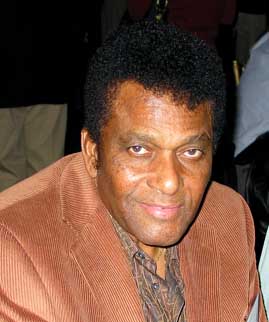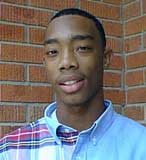Major Works

Charley Pride at the 2008 Mississippi Governor’s Awards. Photo by Nancy Jacobs
- Amy’s Eyes
- Amazing Love
- Honky Tonk Blues
- I Don’t Think She’s in Love Anymore
- Mountain of Love
- Roll on Mississippi
- Should It Be Easier Than This
- The Snakes Crawl at Night
- Kiss an Angel Good Morning
- Just Between You and Me
- Mississippi Cotton Picking Delta Town
- I’m So Afraid of Losing You Again
- Is Anybody Goin’ To San Antone?
- Whole Lotta Things to Sing About
- Sail Away
- I Made Love to You in My Mind
- Moody Woman
- I’m Just Me
- The Day The World Stood Still
- and many, many more
Charley Pride: A Biography
By Damien Allen (SHS)

Damien Allen (SHS Researcher)
Charley Frank Pride was born in Sledge, Mississippi, on March 18, 1934. Charley’s parents were both sharecroppers and cotton pickers. In 1956 Charley’s mother died. Charley’s father retired from driving school buses and cutting hair, and today lives in Quitman County.
Before Charley’s mother died, she and his father had eleven children: eight boys and three girls. Since he was young and couldn’t decide for himself what he could or couldn’t do, he was forced to pick cotton as a child. However, he grew up listening to country music. He walked around the house singing songs of Hank Williams and Roy Acuff.
At the age of six, his happiest moments were spent listening to the Grand Ole Opry on the country music radio station. As the days, weeks, and months went by, Charley was given the nickname “Mocking Bird” by a neighbor who says Charley’s daily chores were to sing each morning and to play baseball.
When Charley Pride was fourteen, he bought his first guitar from Sears and Roebuck and taught himself how to play by listening to different songs on the radio. Charley didn’t want to follow his father’s footsteps. His plan was to become famous in baseball, but his dream was to be a country singer. At the age of seventeen, he began to seek his fortune.
Like any seventeen-year-old, Charley had to get a job, but no matter where he went, he still carried his guitar tucked under his arms. Charley entered a talent contest at Lave’s Grand Theater in Memphis, Tennessee. The following day, Charley left to attend baseball training camp.
Charley’s career was a combination of baseball and singing. Some days when he had a game, he would walk seven miles to pitch nine innings. When the game was over, he would walk back home.
In 1955 he began playing for the American Negro League. Charley played for Detroit, Michigan; Memphis, Tennessee, and Birmingham, Alabama. Then for two years Charley stopped playing baseball to serve in the military. While in the military, Pride married Rozene Cockren, a cosmetologist from Oxford, Mississippi. They have three children: Kraig, Dion, and Angela. They now also have two grandsons, Carlton and Malachi and live in Dallas, Texas.
In 1958, he returned to baseball in the American Negro League where he played with the Birmingham Black Barons. In 1959 Charley Pride spent time working by unloading wood, and playing baseball for Memphis until he was cut from the team. Charley decided to go to Montana to work out, but while he was there he got a job at the Zinc Smelting Manning Company. There he also played semi-professional baseball in Montana. Pride also worked in club Helena two nights a weeks.
By 1960, Pride left semi-professional baseball and the American Negro League to play for a C-team. He also had a chance to try out for the Angels, but he was rejected. Pride tried for the last time to play for the New York Mets. Charley bought six bats and engraved his name in them. He sent the bats along with a telegram to the Mets camp at St. Petersburg. The manager didn’t like Pride because he thought Charley Pride was trying to fit in with the country people. So Charley sent a telegram saying “I’m not a black man singing white man music, I am an American singing American music. I worked out those problem years ago, and everybody else will have to work their way out of it too.” As a result, the manager told the other players if they wanted to see Charley Pride tryout, they would have to take Pride out to a pasture because he wasn’t running a tryout camp. That’s what ended Charley Pride’s baseball career.
Charley went back home where he was to audition and be presented to Jack Clement, Clement was a song writer and record producer. After the audition, Charley proved to Chet Atkins and the manager for the Mets that he wasn’t trying to fit in with the whites, he was just a business man singing American music. Chet Atkins, vice-president of RCA recording in Nashville, realized that Charley Pride’s country singing was a talent. This led Pride to a RCA recording contract.
Two of his best and popular records are Snakes Crawl at Night, and Just Between You and Me, which earned a Grammy in 1968. Pride’s first number one hit on the singles chart was (“All I Have to Offer You Is Me” in 1964. “Kiss an Angel Good Morning” was a million-selling crossover single recorded in 1971. Charley Pride now has more than 36 number one country singles. He has produced more than 35 albums.
Charley Pride has had a great career. On May 1, 1993, Pride joined the Grand Ole Opry. In 1994, the Academy Of Country Music presented him with its prestigious Pioneer Award. In 1994 his autobiography Pride: The Charley Pride Story was published by William Morrow. In 1996, he received a Trumpet Award by Turner Broadcasting, marking outstanding African-American Achievement. His song “Roll On Mississippi” was considered as the official song of his home state, a stretch of Mississippi highway was named for him, and he performed a special Christmas performance for President and Mrs. Clinton at the White House.
He was inducted into the Country Music Hall of Fame in 2000. In 2008 Charley Pride’s talent earned him the state of Mississippi’s top arts award for Lifetime Achievement in the 2008 Governor’s Awards for Excellence in the Arts.
Pride fell ill and died from complications from COVID-19 on December 12, 2020 at the age of 86.
Timeline
- 1938-Charley Pride was born in Sledge, Mississippi
- 1946-Charley listened to the Grand Ole Opry.
- 1952-Charley bought his first guitar.
- 1954-Pride tried to seek his fortune by keeping steady jobs.
- 1956-Charley stopped playing baseball to serve time in the military.
- 1958-Pride returned to baseball and played for the American Negro League.
- 1959-Charley Pride went to Memphis to work and play baseball with the Red Sox, but was dropped from the team.
- 1961-Pride sent his newspaper clippings to Los Angeles Angels.
- 1965-Pride’s first hit single was The Snakes Crawl at Night.
- 1966-Charley won a Grammy Nomination for best Country and Western Male Vocal performance.
- 1972-Pride was named both Male Vocalist and Entertainer of the Year.
- 1975-Pride for the first time sang at the Grand Ole Opry.
- 1967-Pride was signed with RCA recordings.
- 1993– joined the Grand Ole Opry
- 1994– Charley published his autobiography, Pride: The Charley Pride Story. — the Academy Of Country Music gave him its prestigious Pioneer Award.
- 1999–Received a Trumpet Award from Turner and a star on the the Hollywood Walk of Fame.
- 2000–was inducted into the Country Music Hall of Fame.
- 2001- April– Country Music Hall of Fame inductee Charley Pride ‘s CD called A Tribute to Jim Reeves, the first commercial release encoded to prevent tracks from being copied to PCs or uploaded to the internet
- 2003 — Inducted into the Country Music Hall of Fame
- 2008 –Charley Pride named winner of the (Mississippi) Governor’s Award for Excellence in the Arts in Lifetime Achievement.
- 2017 — Received Special Merit award from the Recording Academy, the Lifetime Achievement Award
- 2020 – Charley Pride passed away of complications due to COVID-19 on December 12, 2020
Related Websites
- Official website for Charley Pride
- Charley Pride’s Facebook Page
- CMT’s page on Charley Pride
- Charley Pride on Biography.com
- Charley Pride, country music’s first Black superstar, dies at 86 of COVID-19 complications – Tennessean. Dec. 12, 2020.
Bibliography
- Clarke, Donald. “Charley Pride” The Penguin Encyclopedia of Popular Music. New York; The Penguins Group, 1989.937.938.
- “History of Country Music.” at http://www. countrym…g/awards/ 72_76.htm/,1996. La Blanc, Michael L. “Charley Pride.”
- Contemporary Musicians Volume Four. Detroit; Gale Research Inc., 1991.196.198.
- Sewell, Alexander George and Dwight, Margaret L. “Pioneer Black Country Music Superstars.” Mississippi Black History Makers. Jackson; University of Mississippi, 984.315.316.317.318.319.320.
- “Thirty Years of Pride.” by Rene Ray at http://www.branson….articles/cpride.txt,1997.
